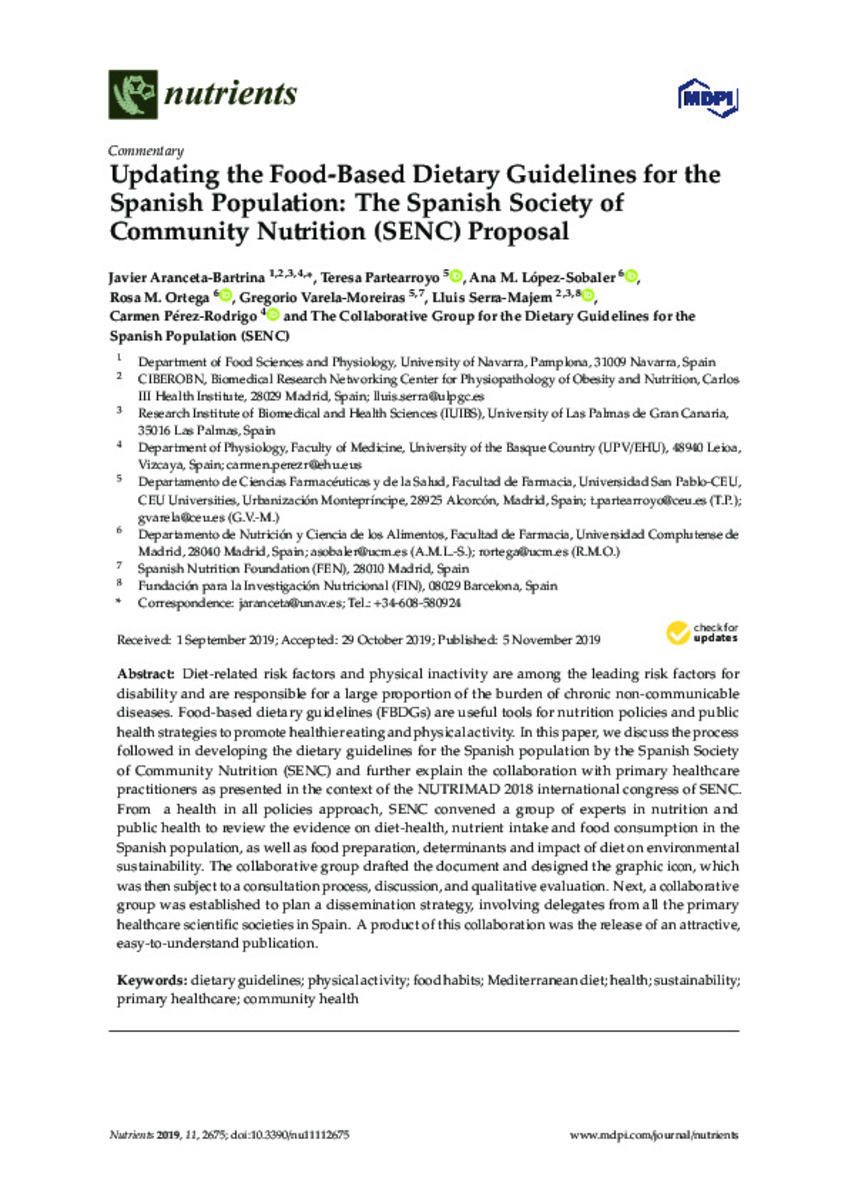Registro completo de metadatos
| Campo DC | Valor | Lengua/Idioma |
|---|---|---|
| dc.creator | Aranceta-Bartrina, J. (Javier) | - |
| dc.creator | Partearroyo, T. (Teresa) | - |
| dc.creator | López-Sobaler, A.M (Ana M.) | - |
| dc.creator | Ortega, R.M. (Rosa María) | - |
| dc.creator | Varela-Moreiras, G. (Gregorio) | - |
| dc.creator | Serra-Majem, L. (Luis) | - |
| dc.creator | Perez-Rodrigo, C. (Carmen) | - |
| dc.creator | The Collaborative Group for the Dietary Guidelines for the Spanish Population (SENC) | - |
| dc.date.accessioned | 2021-10-01T13:15:55Z | - |
| dc.date.available | 2021-10-01T13:15:55Z | - |
| dc.date.issued | 2019 | - |
| dc.identifier.citation | Aranceta-Bartrina, J. (Javier); Partearroyo, T. (Teresa); López-Sobaler, A.M (Ana M.); et al. "Updating the Food-Based Dietary Guidelines for the Spanish Population: The Spanish Society of Community Nutrition (SENC) Proposal". Nutrients. 11 (2675), 2019, 1 - 27 | es |
| dc.identifier.issn | 2072-6643 | - |
| dc.identifier.other | PMID: 31694249 | - |
| dc.identifier.uri | https://hdl.handle.net/10171/62126 | - |
| dc.description.abstract | Diet-related risk factors and physical inactivity are among the leading risk factors for disability and are responsible for a large proportion of the burden of chronic non-communicable diseases. Food-based dietary guidelines (FBDGs) are useful tools for nutrition policies and public health strategies to promote healthier eating and physical activity. In this paper, we discuss the process followed in developing the dietary guidelines for the Spanish population by the Spanish Society of Community Nutrition (SENC) and further explain the collaboration with primary healthcare practitioners as presented in the context of the NUTRIMAD 2018 international congress of SENC. From a health in all policies approach, SENC convened a group of experts in nutrition and public health to review the evidence on diet-health, nutrient intake and food consumption in the Spanish population, as well as food preparation, determinants and impact of diet on environmental sustainability. The collaborative group drafted the document and designed the graphic icon, which was then subject to a consultation process, discussion, and qualitative evaluation. Next, a collaborative group was established to plan a dissemination strategy, involving delegates from all the primary healthcare scientific societies in Spain. A product of this collaboration was the release of an attractive, easy-to-understand publication. | es_ES |
| dc.language.iso | eng | es_ES |
| dc.publisher | MDPI AG | es_ES |
| dc.rights | info:eu-repo/semantics/openAccess | es_ES |
| dc.subject | Materias Investigacion::Ciencias de la Salud::Nutrición y dietética | es_ES |
| dc.subject | Mediterranean diet | es_ES |
| dc.subject | Community health | es_ES |
| dc.subject | Dietary guidelines | es_ES |
| dc.subject | Food habits | es_ES |
| dc.subject | Health | es_ES |
| dc.subject | Physical activity | es_ES |
| dc.subject | Primary healthcare | es_ES |
| dc.subject | Sustainability | es_ES |
| dc.title | Updating the Food-Based Dietary Guidelines for the Spanish Population: The Spanish Society of Community Nutrition (SENC) Proposal | es_ES |
| dc.type | info:eu-repo/semantics/article | es_ES |
| dc.description.note | This article is an open access article distributed under the terms and conditions of the Creative Commons Attribution (CC BY) license (http://creativecommons.org/licenses/by/4.0/). | es_ES |
| dc.identifier.doi | 10.3390/nu11112675 | - |
| dadun.citation.endingPage | 27 | es_ES |
| dadun.citation.number | 2675 | es_ES |
| dadun.citation.publicationName | Nutrients | es_ES |
| dadun.citation.startingPage | 1 | es_ES |
| dadun.citation.volume | 11 | es_ES |
Ficheros en este ítem:
Estadísticas e impacto
Los ítems de Dadun están protegidos por copyright, con todos los derechos reservados, a menos que se indique lo contrario.






